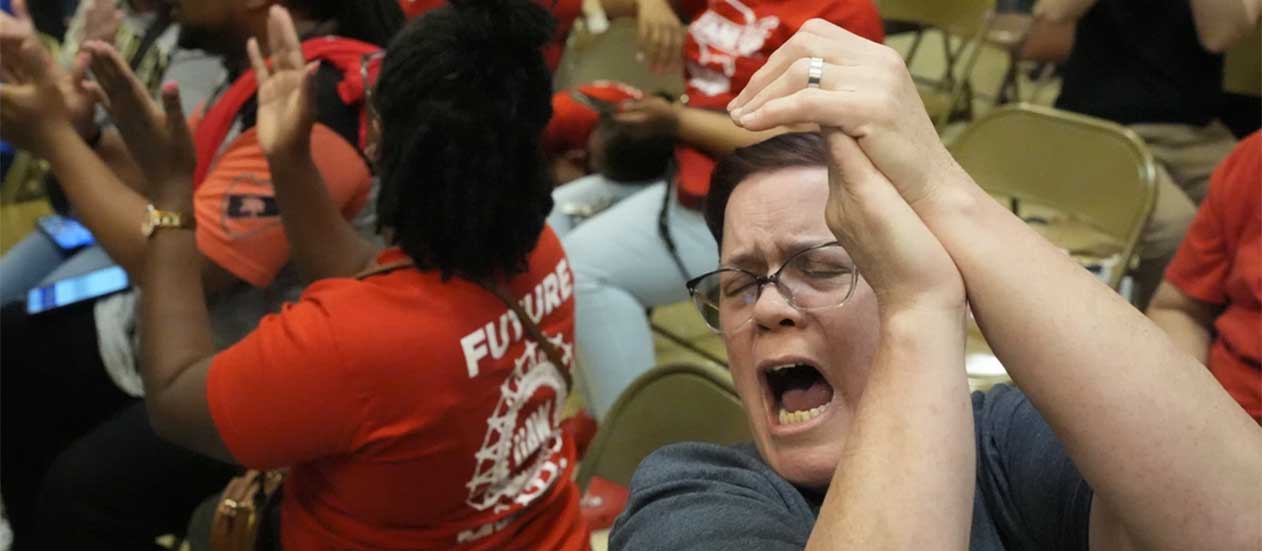
CHATTANOOGA, Tenn.—By almost a three-to-one ratio, Volkswagen workers at its Chattanooga, Tenn., plant gave the Auto Workers their first big win in their new drive to break the anti-union stranglehold in the Deep South. The final tally was 2,628-985 in the three-day vote.
Even Volkswagen bosses in the U.S. had to be impressed with the depth of support for the union. It came on UAW’s third try in a decade at the Chattanooga plant, the German auto giant’s only non-unionized plant worldwide.
And 83% of Chattanooga’s 4,300 workers cast ballots, even in the face of a concerted campaign by six right-wing “Red State” Republican governors to block the workers from going union. The governors were not alone in trying to stop the workers. The union had to file half a dozen labor law-breaking charges against VW of America during the organizing drive at Chattanooga.
The Chattanooga win is the opening salvo in the UAW’s two-year, $40 million drive to unionize the approximately 150,000 non-union autoworkers in the Deep South, almost all of them employees of foreign “transplants.”
It’s also an enormous victory for the union movement and for all workers across the entire country. The nation’s unionists are largely concentrated in the Northeast, the Pacific Coast, and the Great Lakes States. South of the Mason-Dixon line, including in Tennessee, union density is lower, making workers more exploitable by the corporate class.
And since the South is the fastest-growing region of the nation, firms move there, if they don’t decamp abroad, to take advantage of the perceived government leniency towards repression of workers.
The victory is also an enormous blow to systemic racism and its hold over both the South and the entire country. The states of the old Confederacy lure corporations by ingrained anti-union, anti-worker official attitudes but particularly with their ability to pit white against Black workers, forcing the lowest pay on Black workers thereby driving down the wages of white workers and lax enforcement of job safety and health rules, among many other anti-worker measures.
Six, often openly racist Southern governors, including Tennessee’s Bill Lee, claimed in their open letter that unions in general and the UAW in particular threaten that racist system which they described as the Southern “lifestyle.” Chattanooga’s Mayor, Weston Wamp, also opposed the union. All those elected officials are white Southern Republicans.
But in this campaign, the UAW successfully countered the governors and hired union-busters by building on the union’s big win last year with its “Stand up” strike campaign against the Detroit automakers, and by pointing out the transplants, combined, earned just as much in profits—more than a quarter of a trillion dollars—over the last decade as the Detroit automakers did.
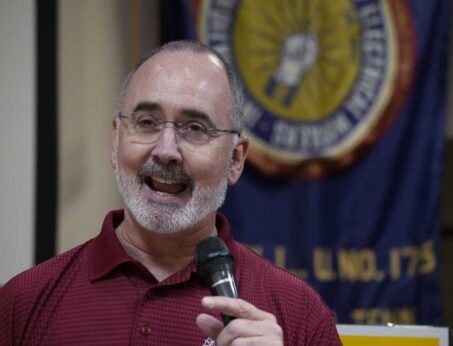
Virtually none of those profits went to the workers in Chattanooga, white or Black. It isn’t going to the workers at UAW’s next big target, the Mercedes-Benz plant in Vance, Ala., either. That vote will be in mid-May.
“The people have spoken the four most important words in democracy,” new UAW President Shawn Fain, the union’s first-ever popularly elected president, told the Chattanooga crowd gathered at an Electrical Workers hall. “It’s an honor to stand here with workers who made history.”
“We now have a voice, and we’re eager to sit down and negotiate a contract,” Victor Vaughn, one of the grass-roots union organizers in Chattanooga, said during the victory rally the night of April 19.
Can bargain for more
Pro-union VW workers emphasized that being unionized can let them bargain for higher wages and better benefits, health and safety on the assembly line, and paid family and sick leave. “Employees are afraid to stay off work,” Vaughn added, for fear of retaliation.
When workers win a big victory, as they did with UAW leadership in strikes against the Big Three last year, it is contagious and the positive mood spreads everywhere. “We saw the big contract that UAW workers won at the Big Three and that got everybody talking,” said Zachary Costello, a VW proficiency trainer. “You see the pay, the benefits, the rights UAW members have on the job, and you see how that would change your life. That’s why we voted overwhelmingly for the union. Once people see the difference a union makes, there’s no way to stop them.”
It has not been lost on anyone that the victory has major implications for all workers in America. “This is a movement for every blue-collar worker in America,” VW auto body plant worker Doug Snyder said. “Our vote shows that workers everywhere want a better life on and off the job. Fair pay is important, but so is time with our families. So is a voice for safety in our plant. We’re looking forward to getting to the bargaining table with the company and winning a contract that makes things right at Volkswagen.”
Fain elaborated on the win in a keynote speech on April 21 at the Labor Notes conference in Rosemont, Ill.
“4,000 workers in Chattanooga did what many people said was impossible,” he said, to a standing ovation. “We did what the pundits said couldn’t be done.
“Every time I did an interview and talked about organizing the South, they did an eye roll and said ‘Do you really think you can win in the South?’ And you know what? Those workers stood up for themselves and they won and that’s how they voted for a union.
“I’m not doing my job as a union leader if I’m not talking about organizing every time I speak.”
President Joe Biden, who walked picket lines with the UAW during its Stand Up strike and who publicly proclaimed he aims to be the most pro-union president in U.S. history, also applauded the win.
In their letter, the six Republican governors also portrayed the union as more interested in re-electing Biden—whom they hate—than in the workers. That argument flopped.
“I congratulate the Volkswagen autoworkers in Chattanooga who filed for a union election with the UAW,” Biden said in his statement. “As one of the world’s largest automakers, many Volkswagen plants internationally are unionized. As the most pro-union president in American history, I believe American workers, too, should have a voice at work. The decision whether to join a union belongs to the workers.”
UAW is moving on to organize the Mercedes plant in Alabama, again after the workers there came to the union after seeing the success UAW gained in bargaining with the Detroit automakers.
It won back almost all the concessions workers were forced to make—in pay, pensions, benefits, and more—since the financier-caused Great Recession of 2008 drove two of the three Detroit-based automakers—GM and FiatChrysler—into bankruptcy. The federal government forced concessions on the workers in return for loan guarantees and several years of control.
We hope you appreciated this article. At People’s World, we believe news and information should be free and accessible to all, but we need your help. Our journalism is free of corporate influence and paywalls because we are totally reader-supported. Only you, our readers and supporters, make this possible. If you enjoy reading People’s World and the stories we bring you, please support our work by donating or becoming a monthly sustainer today. Thank you!




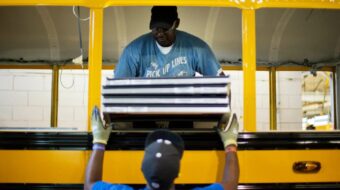
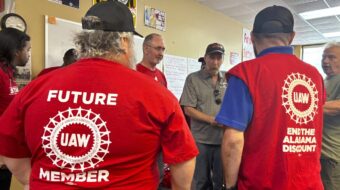
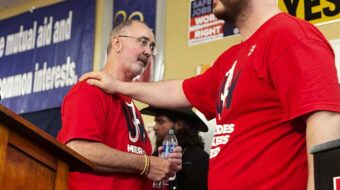





Comments